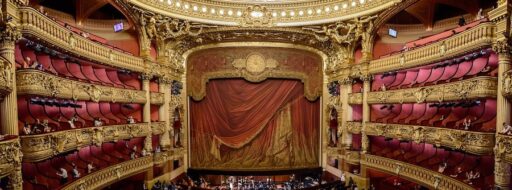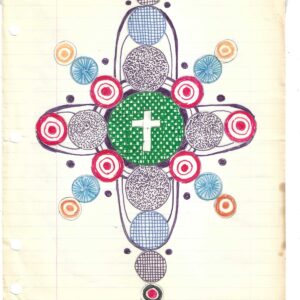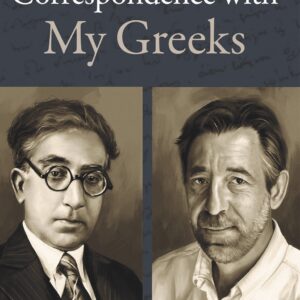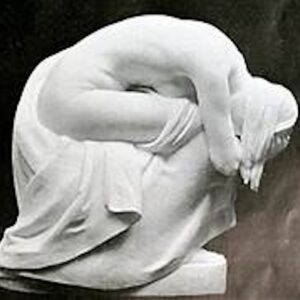The marvelous thing about the first paragraph of Mozart in Motion: His Work and His World in Pieces (Farrar, Straus and Giroux, 2021), by Patrick Mackie, is how carefully the narrator builds Mozart’s world in front of our eyes, as if it were being created sentence by sentence as we read about it:
Opening nights of new operas may be the most fraught of all. So many things have to go right. The paint must have dried on the backdrops, the soprano’s throat must be clear of infections and the tenor of overly distracting fits of pique. The orchestral players must be confident that their strings or reeds will behave themselves. Enough copies must have gone out, and everyone needs to know what big aria has been cut at the last minute. Large amounts of money hinge on the airy stuff that musical performance comprises. An eerie tension awaits anyone without enough to do. No one can control how the audience will react, though sometimes in the eighteenth century sections would be paid to get their reactions right. Mozart’s era often left it unclear who was meant to be in charge of this broadly purposeful chaos: the role of the conductor had for one thing not yet attained its later clarity. As the first notes got closer, an entire social world was readying itself to be funneled into drama and music.
There’s so much to enjoy here. The narrator’s breathless tone, for example, as if we’re already rushing to our seats and catching by chance a conversation already underway: “Opening nights of new operas may be the most fraught of all.” The breathlessness doesn’t relax as we, guided by the narrator’s voice, look around the scene before us. “So many things have to go right,” he proclaims in a kind of charmed anxiety, then lists so many of the things that could actually go wrong in a parallel series of almost comical causes of delay: the soprano’s scratchy throat, the tenor’s hissy fits, the slowly drying paint, the disobedient strings and reeds.
But perhaps the narrator’s primary feat here is his gradual and almost unnoticeable expansion of the immediately visible scene to the larger, less tangible forces trying to shape it. Those forces too are at a high pitch of anxiety. The opera’s invisible investors watch helplessly as their funds teeter in the balance. How could they have been so unwise as to bet their savings on the production of mere “airy stuff”? Maybe it makes sense to rig the outcome by hiring cheerleaders. Anyway, it’s better to be busy with throats, moods, paint, string, reeds, bribed boosters or bets than with nothing at all. Anything to impose order on a chaos being actively invited by the possible absence of a conductor. But perhaps, just perhaps, a minor miracle will occur and, despite all odds, “an entire social world” will be “funneled into drama and music.”
All that is missing in the narrator’s vision are the main ingredients of success: a great composer and a great opera.
Of course we already know who that great operatic composer will be from the book’s title. But in starting off by presenting an opera’s opening night in an almost generic form, the narrator emphasizes a key strategy throughout the book. What we will be reading about is not just Mozart and his operas and other works most interesting to the author but also about the stage—the personal, musical, societal, political, philosophical world—on and in which the composer and his compositions not only came to life, in the eighteenth century, but also come to life today and will continue to for the foreseeable future.
Further still: Mackie’s ambition is not just to parallel those two forces, the disciplined tumult of Mozart’s genius and the turbulence of social change in late eighteenth century Europe, but also to evoke in his own prose the interrelation, even the dialogue, usually “fraught” (one of Mackie’s favorite words), between the two.
“Fraught” plays such a role because, as we see in Mackie’s opening paragraph, the dialogue between composer and his musical world was intense and unpredictable, capable of highs and lows of success and failure, but marked by often paradoxical strains between them. For Mozart’s genius was always reaching for two goals at once: back to satisfying the conventions of the classical models with which he came of age, forward to giving play to the breaking of boundaries in what became in the next century early modernism. Meanwhile his surrounding culture was struggling with its own tensions: preserving the time-tested social and political arrangements of the Hapsburg Empire, while also acceding to the individualist strains of what would soon become revolutionary revolt in France.
Let’s return to the opening scene at the still-unnamed opera to see how these tensions are played out. The opera soon does get a name—not unexpectedly, Don Giovanni— and anybody who’s anybody in Vienna is there for its opening. (The “aria” mentioned below is sung by Don Giovanni’s servant Leporello, who gleefully recounts his master’s one thousand and one sexual conquests.):
The opening of a new opera brought the disparate, spinning social and cultural forces of late eighteenth-century Europe together like no other occasion, and in this aria Mozart satisfies all the motives of pleasure and excitement that took people to the opera while turning them inside out. Europe was wavering on the brink of the modern world, and Mozart became the key artist of the modern world because his music was so richly fired by so many of the factors and energies at work in this process. Sometimes this Europe was as elegant as its nicest fictions claimed and sometimes it was as violent as its turbulent energies suggested…. Extremes of skill and originality are needed to represent a world as teeming and fructile as richly as he did. Mozart guides us through his restless historical world, and thinking more deeply about the world in which he worked should also change how we hear his music: our ears should open to more of what those beautiful sounds chase after.
And we’re off and running on a brilliant, high-energy, cheekily flamboyant tour (hmm, is “fructile” really a word??) through a creative life and its works and its times which were as fraught our own. Mozart in Motion indeed.
After getting his PhD in English literature, George Dardess taught close reading to his own students until his retirement. Since then he has been ordained a Deacon in the Roman Catholic Church and written several books on Muslim-Christian relations. He has also created the graphic novel Foreign Exchange.





